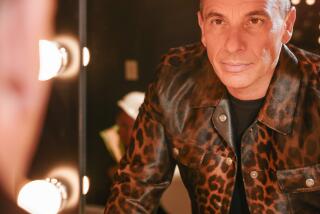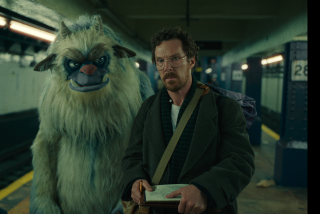Without No Doubt
- Share via
ANAHEIM — It’s not unusual for well-meaning strangers to drive by Eric Stefani’s house and scream at it.
“No Doubt!” they’ll yell, to show that they know the secret of this modest tract home: It’s the headquarters and rehearsal hall of the rock band No Doubt--or it was until the band’s third album hit big this year. No Doubt, which plays a sold-out homecoming concert Thursday at UC Irvine’s Bren Events Center, now resides mainly on the road and in the top 10 of the pop albums chart.
Stefani, 29, is the one who stayed home. He founded the band 10 years ago with his sister Gwen and served as its main creative cog, playing keyboards and doing the bulk of the songwriting.
Then things changed. No Doubt went through a long, frustrating, trial-and-error process to produce an album it wound up calling “Tragic Kingdom,” and though Stefani stayed long enough to finish the album, he quit the band near the end of 1994.
Soon thereafter, the album took off, propelling No Doubt to stardom; it has sold more than 2 million copies in the year since its release.
But Stefani had made his decision: The grind of touring and the spotlight of rock stardom were not what he wanted. What he did want was to concentrate on drawing Bart Simpson--and Marge, Homer and Lisa too. Doubly gifted as a musician and an animator, Stefani has carried on a double career, simultaneously helping to launch a hit rock band and, as a staff artist for “The Simpsons,” helping to bring a hit cartoon to life.
Sometimes, he says, he will emerge from the No Doubt house to chat with those pilgrims who come by to scream and gawk. “They’ll say, ‘Hey, you’re the guy who used to play with them. Why’d you quit?’ ” He says he answers with the simple, factual truth: “I wanted to go back to drawing, and all the musical juices were sucked out of me at that point.”
The emotional truth is more complex.
Stefani is a solidly built 6-footer whose most pronounced features are large brown eyes set below brows that are dark, curving slashes; and neat, greased hair that hangs in strands over his forehead. He speaks softly, using no word harsher than “dang.”
“That whole passage of my life is unclear,” he begins in a soft, halting voice, his mouth remaining open during long pauses, as if waiting for his feelings and thoughts to shape themselves into words. “I was messed up inside. I was troubled. I didn’t know what direction to go.”
A local favorite since the late ‘80s for its colorful shows focusing on Gwen’s theatrics as its singer, No Doubt had weathered the flop in 1992 of its first national release, and had endured the frustrating recording process for “Tragic Kingdom” as producers and executives at Interscope Records rejected a good deal of the material the band initially submitted.
Meanwhile, the band’s inner dynamic was changing. Early on, Eric had been the acknowledged creative dynamo: “He’s such a psychotic genius that we just leave him alone,” a half-joking Gwen had noted in promotional copy attending the first album. But on “Tragic Kingdom,” she, guitarist Tom Dumont and bassist Tony Kanal had begun to come into their own as writers too. Eric still was a force, writing two of the record’s 14 songs himself and sharing credit on five others. But he no longer was the creative cornerstone.
He says that isn’t what pushed him out of the band. But it did open a door that he eventually chose to take. With others able to handle the writing--the part he loved--he felt free to leave the band and avoid the touring and promotion that always seemed a distraction from the hands-on creative work he cherished.
“It was like being the father of a kid, and it was time to let go,” he says now. “For the long run it worked out for the best for everyone, including myself.”
*
Interviewed earlier this year, as No Doubt’s success was just beginning to unfold, Gwen hit on the same parent-child dynamic in talking about her older brother’s departure:
“Eric was in some ways the dad, the teacher. He taught me everything I know. He wasn’t happy for a long time. It wasn’t a surprise [when he left]. For me, it was terrible, but it opened a lot of creative space for the rest of us.”
Creative space is a gift that Eric Stefani has enjoyed in abundance, throughout his life.
Dennis Stefani recalls the first work of art by the oldest of his four children: a happy-faced sun, shooting out rays of light, which Eric drew on his bedroom wall before he was two. By the time he was in the sixth grade, his habit of drawing everywhere--including on classroom desk tops--had landed him in after-school detention, scrubbing away his handiwork.
But it also had attracted the big kids’ notice: Students at a nearby junior high drafted this precocious elementary school talent to draw for their school newspaper.
At the same time, his parents were paying for piano lessons for him, but Eric was rendering them useless: He could play everything by ear, so he didn’t bother learning to read the notes.
Smitten by Madness and other English rock bands that were reviving the light-skipping Jamaican rhythms called ska in the early ‘80s, Eric indoctrinated Gwen, and they began organizing groups to play at talent shows at Loara High School. No Doubt began in 1987, two years after Eric graduated.
He says the years before ’92 were pure pleasure. The pressures of recording for a major label had not set in. He could entwine the two strands of his talent by writing quirky, structurally complex songs for the band, and by designing the posters and T-shirt logos that helped No Doubt establish its image. One of them was a striking drawing of an airborne, ponytailed Gwen screaming into a microphone.
Meanwhile, he was making headway as a cartoonist. Friends who were working as gofers for Ralph Bakshi, creator of “Fritz the Cat,” helped the 20-year-old submit his portfolio to the famous animator.
“He called me in and said, ‘Some pretty good stuff. Welcome to the animation business, son,’ ” Stefani recalls, mimicking Bakshi’s lisping voice. Bakshi started him off at $350 a week to draw for his newest cartoon, “The New Adventures of Mighty Mouse.” The deal was rescinded within a week when the young artist proved to be in over his head. But Bakshi consented when Stefani asked if he could just hang out and learn. Among those who taught him and became a mentor was John Kricfalusi, the “Mighty Mouse” director who soon would become famous in the cartoon world for creating “Ren & Stimpy.”
By 1989, Stefani had landed a job drawing for “The Simpsons,” then a short cartoon contained within “The Tracey Ullman Show,” but soon to be a successful series. He has worked both full time and part time on “The Simpsons” since then, except for a year off to attend Cal Arts, and for pauses when No Doubt would get particularly busy.
“The Simpsons” has been his living since he left the band. Having traded in a chance at the spotlight, he now works long hours in a dimly lit warren of cubicles in a North Hollywood office building where some 70 people labor in near-silence.
Dominic Polcino, a director on “The Simpsons,” says Stefani is “pretty thorough, sometimes to the point of neurotic. He’s always asking me if something [he has drawn] is OK, and it’s already great.”
In one episode, when Marge Simpson became a cop, Stefani had to execute an action sequence in which she rolled on the ground, then popped up pointing a gun. To get it right, he had one of his buddies serve as a model for Marge, rolling around the front lawn of the No Doubt house until Stefani had the action planted in his mind’s eye and plotted on a sketch pad.
Even as he plans new ventures in cartooning--aiming eventually to create shows of his own--Stefani does not disguise his continued emotional attachment to No Doubt.
“When I first heard ‘Just a Girl’ [the band’s first hit] on the radio, I had tears rolling down my face,” he says. “After eight years, it was such a rush just to see we were making some impact on the world.”
He was in tears again in March at the Pond of Anaheim while he watched No Doubt perform--the only time he has seen the band play since he quit.
“It was weird. I had tears of sorrow and joy at the same time. It wasn’t a feeling of jealousy or anything like that,” but a bittersweet sense that a chapter of his life was being fulfilled.
But music is far from a closed chapter in his life. His parents say that his creativity always has been a strong but alternating current, and that it’s important for one outlet to be available when the other’s flow subsides. An Eric without fresh artistic ideas can be an Eric in a funk, says his mother, Patti Stefani.
That certainly was not the case recently, she said, when he went into the bathroom of her house in Anaheim, emerged with lyrics scribbled on sheets of toilet paper, sat down at the piano and played her the song he had just written.
“When it comes,” she said, “he has to put it down.”
Chris Huicochea, who has known Eric for 10 years, says his friend hasn’t lost his flair for entertaining since leaving No Doubt. A year or so ago, said Huicochea, who is a portrait artist at Disneyland, they were at the Disneyland Hotel with some friends when Stefani sat down at a piano and began making up musical caricatures of the people walking in and out of a ballroom. It was cartooning for the ear, with a different melodic and rhythmic motif for each person.
“He had us all roaring,” Huicochea recalls, “because the caricatures fit to a T.”
Most important for his musical future, Stefani is co-author of a top 20 hit on the airplay charts--No Doubt’s new single, “Don’t Speak.”
He started the ballad, as is his habit, in the middle of the night. He says he came up with the melody, title and preliminary lyrics; Gwen gave it a new, romantic slant the following day, softening its tone from the decidedly unromantic self-indictment Eric originally had in mind.
Eric says the song reflects the key lesson he learned toward the end of his time in No Doubt--that sometimes simpler, pared-down music works better than the sort of complex music he had tended to write. He aims to return to professional songwriting and has some writing sessions planned with Gwen after No Doubt gets off tour in December.
Whatever lies ahead, his share of the songwriting and album sale royalties for “Tragic Kingdom” is coming in, giving him a fiscal cushion for future creative work.
Will it be music or animation? Will he drop Bart and Homer in favor of Clean Little Clara and Messy Little Matthew, a sort of toddler “Odd Couple” he has in mind? He isn’t making any sudden changes. Maybe, he says, he can do it all. Having dropped out of a band that went on to stardom without him, he has found that his parachute was multicolored.
“So many people out there are trying to make it, and I’m so lucky to be doing any of this stuff. I couldn’t ask for more.”
More to Read
The biggest entertainment stories
Get our big stories about Hollywood, film, television, music, arts, culture and more right in your inbox as soon as they publish.
You may occasionally receive promotional content from the Los Angeles Times.










